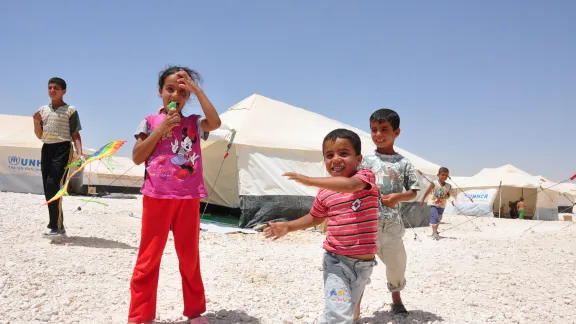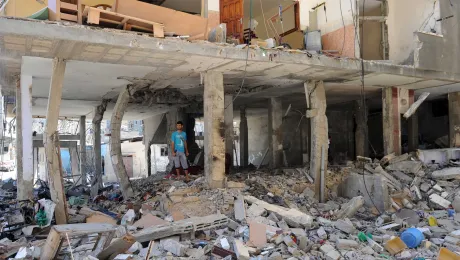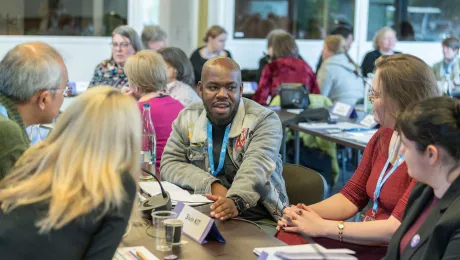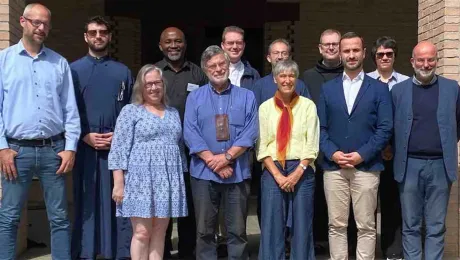
Children playing at the Za'atri refugee camp in Jordan © LWF/R. Schlott
LWF Prioritizes Children’s Needs among Syrian Refugees at Za’atri Camp
(LWI) Asia (15) and Fatimah (13) are two sisters from a village in Daraa region, southern Syria. Their family—father, mother, three younger brothers and their paternal grandmother—arrived by car at the Za’atri refugee camp in northern Jordan one month ago. Like so many others, the family fled their village due to continuing violence and destruction in the civil conflict that has lasted over two years now, forcing over 1.6 million people to seek refuge in neighboring countries including Jordan.
The family lives in two tents at Za’atri: one for the parents and children, the other for their grandmother also named Asia. It is dusty inside the tents, and there is sand in the drinking water they draw from the communal water tanks, which are quite a distance away. There is only one shared kitchen and bathroom per street of up to 80 tents.
The intensified fighting is only pushing more Syrians out of their country. In Jordan, currently home to over 470,000 refugees from Syria, the influx puts a major strain on support provided by The Lutheran World Federation (LWF) and other organizations collaborating with the United Nations High Commissioner for Refugees (UNHCR) and the Jordanian government.
Through an emergency relief program coordinated by its Department for World Service (DWS), the LWF has been supporting refugees at Za’atri camp since August 2012, when the numbers there were as low as 25,000. LWF’s camp management services currently cater to more than 142,000 people. Other assistance includes distribution of basic food and non-food items, education for children, child protection, and mental health and psychosocial care.
Other Family Members
Returning home is not an option Asia’s family would consider now, barely two months after the ordeal of escaping through back tracks and indirect routes, telling government soldiers they were simply moving to another village in the region, says the girls’ grandmother also named Asia. The family witnessed fighting along the way, saw many destroyed houses, and heard graphic stories of violence and psychological trauma, stories of people "dying of fear,” she adds. They stay in touch with family members who are still in Syria by mobile phone communication, but the news they hear is often all bad.
Settled at Za’atri for now, they have a ration card but the food quantity is limited, and the heat in the camp at this time of the year is unbearable. While the family yearns to return home, they do not see any end in sight to the crisis. "I am so lonely, I cry every day," says the younger Asia. She adds that her friends from home are spread across the region, as far as Turkey and Lebanon.
“The refugees we work with express their hope for an end to the conflict so that they can go back and begin rebuilding their homes and lives. The longer the forced displacement situation lasts the higher the toll on every individual, especially children and youth,” says Roland Schlott, DWS program officer for Asia.
Child Protection and Psychosocial Care
Children under the age of 18 years make up 55 percent of the Syrian refugee population. “The destruction of many schools in the conflict and the subsequent displacement of families disrupt children’s formal education for months. In some areas it has stalled for two years now because of the impact of the intense fighting,” adds Nader Duqmaq, coordinator of the LWF emergency program in Jordan.
At Za’atri, there are only about 10,000 children benefitting from formal education, out of approximately 36,000 children of school-going age. Asia does not attend any school in the camp, and has not made any friends since the family arrived. She spends her days cleaning the tent and fetching water with her mother and grandmother. She says she wants to be a computer engineer. But there are no computer science classes in the few schools at the camp.
Fatimah goes to a school run by the UN Children’s Fund, which is relatively close to the family's tents. She proudly tells LWF staff that she has made many friends in her school and would like to be a doctor when she grows up.
Door-to-door visits by LWF staff provide families like Asia’s with information about refugee support services offered by the different humanitarian organizations in the camp.
Constraints
Schlott notes however that LWF’s work at Za’atri faces severe constraints because of the lack of financial resources to expand the ongoing operations.
He underscores that LWF Jordan will continue addressing the needs of refugees in the camp through psychosocial support services such as counseling, joint activities for children and adults, as well as training for peace building and conflict mitigation. Plans in the coming weeks include distribution of clothes suitable for the warm weather, sandals as well as beddings.
(Heather Patterson, LWF/DWS Program Assistant in Jordan, contributed to this article.)
World Refugee Day message by DWS director Eberhard Hitzler and slideshow



